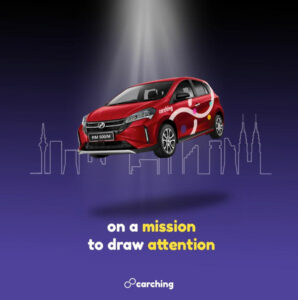By Almira Louise S. Martinez
MALAYSIA-BASED startup Carching Ventures Sdn. Bhd. has launched its service in the Philippines to help drivers earn from product ads while driving.
“It’s just doing what they’re supposed to do during the day, and they get paid by utilizing their car,” Carching Chief Operating Officer and co-founder Thalia Bondoc said in a Zoom interview last week.
Drivers in Southeast Asia including the Philippines, Singapore, Malaysia, and Indonesia face the same problems such as traffic jams and the rising cost of repairs, said Jeshua Choong, chief executive officer and co-founder of Carching.
Passive income from the Carching app could help them ease these costs, he pointed out. “They can earn passive income through advertising. We’re in the same traffic, we’re on the same road. Why can’t we earn the same money as well?”
Using the app, Filipino drivers can register for free by submitting a copy of their license and filling out the application forms.
The company, whose slogan in Malaysia is “Turning your KM into RM (Malaysian ringgit),” will then conduct a know-your-customer procedure to ensure applicants own or have permission to drive the car.
The ads, which are made of vinyl wraps, are then installed on the car body.
Drivers could earn as much as P2,000 a month once they reach their distance quota per campaign, Ms. Bondoc said.
Drivers can also pick the brands they want to advertise in their cars. “It will be like a little Tinder card — swipe left, swipe right,” Mr. Choong told Businessworld.
“The drivers become the ambassadors themselves because they are not forced to put whatever brands on the car,” he added.
Looking back at their journey, Mr. Choong said one of their clients sparked the idea of branching out in the Philippines.
“One of our biggest clients actually expanded to the Philippines and they were looking around and they can’t find a similar solution in the Philippines,” he said. This prompted Carching to assess the Philippine ad scene.
“How many hours do you get stuck on EDSA on a weekly basis?” he asked. “There are so many billboards there, media is still very traditional.”
In January, the Metropolitan Manila Development Authority said EDSA remained the busiest road in Metro Manila. About 400,000 cars pass through the highway daily, above its 300,000 capacity, the agency said.
Ms. Bondoc said entering the Philippine market was easy because drivers were already looking for other ways to earn, and brands were looking for more advertising avenues.
Although Carching has competitors, Mr. Choong said what sets them apart is their technology to provide the number of impressions generated during a campaign.
“We are able to track where all these vehicles go on a per-second basis,” he said. “We are able to get GPS pings of all the cars that we deploy and from there, we’ll be able to generate a heat map.”
“We also come out with our own algorithm to estimate how many cars you will pass by on different roads in Manila,” he added.
The Carching app has been downloaded about a thousand times on Google Play.
Mr. Choong said the company has given back $40,000 (P2.3 million) to their drivers in Malaysia and hopes to do the same in the Philippines.
The service is available in Metro Manila and aims to reach close to a thousand drivers by yearend, he added.






